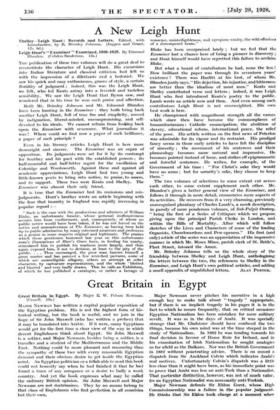A New Leigh Hunt Leigh Hunt's " Examiner " Examined,
1808-1825. By Edmund Blunden. (Cobden-Sanderson. 15s.) Tun publication of these two volumes will do a great deal to reconstitute the character of Leigh Hunt. His excursions into Italian literature and classical criticism had left us with the impression of a dilettante and a hedonist. We saw his quick and easy enthusiasms, graces of style, a certain floridity of judgment ; indeed, this was the Leigh Hunt, we felt, who led Keats astray into a feverish and tasteless sensibility. We saw the Leigh Hunt that Byron saw, and wondered that in his time he won such praise and affection.
Both Mr. Brimley Johnson and Mr. Edmund Blunden have been hunting in the Examiner : they both bring back another Leigh Hunt, full of true fire and simplicity, moved by indignation, liberal-minded, uncompromising, and self- devoted to his ideals. We cannot refrain from looking back upon the Examiner with reverence. What journalism it was ! Where could we find now a paper of such brilliance, a paper of such principle ?
Even in his literary articles Leigh Hunt is here more .downright and sincere. The Examiner was an organ of opposition. Its judgments were set for it by its contempt for Southey and his pact with the established powers ; its half-mournful and half-bitter regret for the vacillation of Coleridge and Wordsworth. Against these and against all academic appreciations, Leigh limit had two young and little-known poets to bring into notice, to praise, to assess, and to support. These two were Keats and Shelley. The Examiner was almost their only friend.
It is true that the Examiner had its omissions and mis- judgments. Hunt's brother wrote an article beginning with the fear that insanity in England was rapidly increasing in popular regard :— " Such is the case with the productions and admirers of William Blake, an unfortunate lunatic, whose personal inoffensiveness secures him from confinement, and, consequently, of whom no public notice would have been taken, if he was not forced on the notice and animadversion of The Examiner, as having been held up to public admiration by many esteemed amateurs and professors as a genius in some respects original and legitimate. The praises which these gentlemen bestowed last year on this unfortunate man's illustrations of Blair's Grave have, in feeding his vanity, stimulated him to publish his madness more largely, and thus again exposed him, if not to derision, at least to the pity of the public. . . . Thus encouraged, the poor man fancies hiniself a great master and has painted a few wretched pictures, some of which are unintelligible allegory, others an attempt at sober character, by caricature representation, and the whole ' blotted and blurred ' and very badly drawn. This he calls an Exhibition, of which he has published a catalogue, or rather a farrago of
nonsense, unintelligibleness, and egregious vanity, the wild effusions of a distempered brain."
Blake has been overpraised lately ; but we feel that the Examiner lost a chance here of being a pioneer in discovery ; and Hunt himself would have regretted this failure to acclaim Blake.
But what a board of contributors he had, none the less ! How brilliant the paper was through its seventeen years' existence ! There was Hazlitt at his best, of whom Mr. Blunden justly says, " His dejection, his injustice, and bitterness are better than the idealism of most men." Keats and Shelley contributed verse and letters ; indeed, it was Leigh Hunt who first introduced Keats's poetry to the public. Lamb wrote an article now and then. And even among such contributors Leigh Hunt is not overweighted. His own best work is here.
He championed with magnificent strength all the causes which since then have become the commonplaces of humanitarianism : Catholic emancipation, the abolition of slavery, educational reform, international peace, the relief of the poor. His article written on the first news of Peterloo was admirable for its vigour and its restraint. His prodigal fancy seems in those early articles to have felt the discipline of sincerity ; the movement of his sentences and their phraseology becomes more natural and impressive. He becomes pointed instead of loose, and strikes off epigrammatic and forceful sentences. He writes, for example, of the Government of his time " For Christ's sake they would have no arms ; but for security's sake, they choose to keep them."
The two volumes of selections to some extent cut across each other, to some extent supplement each other. Mr. Blunden's gives a better general view of the Examiner, and follows it through in more detail, enumerates more aspects of its activities. He recovers from it a very charming, previously unrecognized phantasy of Charles Lamb's, a mock description, in parody of more ponderous volumes, of Sub-Pulpit Oratory, "being the first of a Series of Critiques which we propose giving upon the principal Parish Clerks in London, and within the Bills of Mortality. After which will follow sketches of the Lives and Characters of some of the leading Organists, Churchwardens and Pew-openers." His first (and only) article of the series was an appreciation of the impressive manner in which Mr. Moses Mims, parish clerk of St. Bride's, Fleet Street, intoned the Amen.
Mr. Brimley Johnson tells us the whole story of the friendship between Shelley and Leigh Hunt, anthologizing the letters between the two, the references to Shelley in the Examiner, and Leigh Hunt's own political articles, and adding a small appendix of unpublished letters. ALAN PORTER.




































 Previous page
Previous page